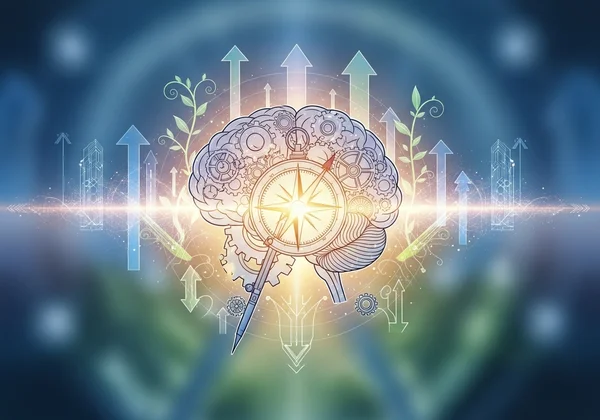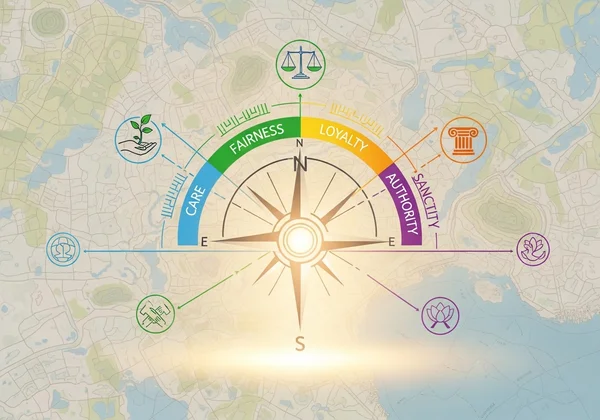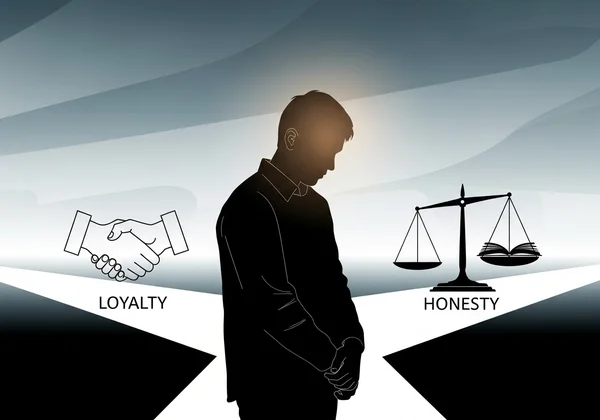도덕성 테스트: 통찰력을 윤리적 성장에 적용하세요
August 10, 2025 | By Julian Croft
성격이나 가치관 퀴즈를 풀고 결과를 본 뒤 "이 결과를 어떻게 활용해야 할까?"라고 생각해 본 적이 있나요? 흔히 드는 생각입니다. 자신의 모습을 한눈에 파악하는 것은 흥미롭지만, 그 지식을 성장에 활용하는 데 진정한 힘이 있습니다. 도덕성 테스트 를 치렀다면, 단순한 점수를 넘어설 특별한 기회를 얻은 것입니다. 윤리적 틀에 대한 통찰력을 얻었습니다. 이제 이러한 발견을 일상생활에 통합하고 " 도덕성과 가치관을 어떻게 파악할까"라는 질문에 진정으로 답하는 방법을 탐구해 봅시다.
이 가이드는 통찰력을 행동으로 전환하는 데 도움을 줄 것입니다. 테스트 결과는 종착점이 아니라 윤리적 성장을 향한 의미 있는 여정의 시작입니다. 프로필 해석, 일상 과제에 대한 교훈 적용, 그리고 더 의식적이고 원칙적인 삶을 가꾸는 방법을 탐구할 것입니다. 이러한 통찰력이 당신의 개인적 성장을 어떻게 이끌 수 있는지 살펴볼 준비가 되셨나요? 개인 윤리 개발의 여정을 시작해 봅시다.

도덕성 테스트 결과 해독: 표면 너머
도덕성 테스트 결과를 활용하는 첫 번째 단계는 단순히 라벨이나 점수로 보는 것을 넘어선 것입니다. 보고서를 내면의 윤리적 지형을 상세히 보여주는 지도로 여기십시오. 도덕적 신념의 최고점과 불확실성을 마주할 수 있는 계곡을 강조합니다. 판단이 아닌 탐구를 위한 도구입니다. 윤리학자와 심리학자들이 제작한 도덕성 테스트 평가 는 이러한 다각적인 관점을 제공하도록 설계되었습니다.
결과는 깊은 성찰을 위한 출발점을 제공합니다. 무의식적으로 결정을 이끄는 근본적인 원칙을 드러냅니다. 이러한 근본적인 요소를 이해함으로써 더 의도적이고 일관된 선택을 시작하여 진정한 개인적 성장을 촉진할 수 있습니다.
윤리적 나침반 및 핵심 가치 이해
윤리적 나침반 은 옳고 그름에 대한 내면의 감각입니다. 복잡한 상황을 헤쳐나가는 데 의식적으로든 무의식적으로든 사용하는 틀입니다. 상세한 도덕성 평가는 이 나침반을 명확히 하는 데 도움이 됩니다. 보고서는 보살핌, 공정성, 충성심, 권위, 신성함과 같은 도덕적 기초 중 어떤 것을 가장 중요하게 생각하는지 밝혀줄 수 있습니다.
답변의 패턴을 살펴보십시오. 해를 방지하는 결정(보살핌)으로 일관되게 경향이 있습니까? 아니면 규칙과 전통(권위)을 지키는 것을 우선시하나요? 이러한 경향을 인식하는 것은 핵심 가치 를 이해하는 첫 번째 단계입니다. 이것들은 단순한 추상적인 아이디어가 아니라 당신의 정체성과 세상과의 상호 작용을 형성하는 적극적인 원칙입니다.

개인 윤리 개발을 위한 핵심 통찰력 식별
진정한 개인 윤리 개발 은 보고서에서 구체적이고 실행 가능한 통찰력을 파악할 때 시작됩니다. 요약만 훑어보지 말고 세부 사항을 자세히 살펴보십시오. 강점과 개선이 필요한 영역 모두를 찾아보십시오. 예를 들어, 공정성에 대한 강한 감각을 가지고 있지만 때로는 공동체에 대한 충성심의 중요성을 간과할 수 있습니다.
이러한 세부적인 차이를 식별하는 것이 중요합니다. 이것은 성장을 위한 당신만의 맞춤형 로드맵입니다. 스스로에게 질문하십시오. 내 핵심 가치는 서로를 어떻게 지지하는가? 어디에서 충돌할 수 있는가? 이러한 질문에 답하면 자신의 도덕적 프로필을 아는 것을 넘어, 자기 개선과 삶에서 더 나은 의사 결정을 위해 이를 적극적으로 활용하는 데 도움이 됩니다. 자신만의 상세한 통찰력을 얻으려면 언제든지 테스트를 치를 수 있습니다.
도덕적 성장 및 자기 개선을 위한 실행 가능한 전략
윤리적 프로필에 대한 더 명확한 이해를 바탕으로 다음 단계는 모두 적용에 관한 것입니다. 진정한 도덕적 성장 은 인식을 행동으로 전환할 때 발생합니다. 이 섹션에서는 통찰력을 일상 생활에 통합하여 윤리적 이해를 일상에서 실천하는 것으로 만드는 실용적인 전략을 제공합니다. 윤리적 자기 개선 의 이러한 여정은 학습과 개선의 지속적인 과정입니다.
이러한 전략은 "완벽한" 사람이 되는 것에 관한 것이 아닙니다. 대신, 더 자기 성찰적이고 의도적인 사람이 되는 것에 관한 것입니다. 삶의 불가피한 도덕적 복잡성을 더 큰 자신감과 무결성으로 헤쳐나가는 데 도움이 될 것입니다.
가치 충돌 및 윤리적 딜레마 해결
도덕성 테스트 결과의 가장 강력한 적용 중 하나는 가치 충돌 해결 입니다. 삶은 종종 우리가 소중히 여기는 두 가지 가치가 충돌하는 윤리적 딜레마 를 제시합니다. 예를 들어, 친구에 대한 충성심은 친구가 잘못된 일을 했다는 것을 발견했을 때 정직에 대한 헌신과 충돌할 수 있습니다.
그러한 딜레마에 직면했을 때 도덕성 프로필을 다시 확인하십시오. 충성심과 정직성 모두에 대한 강한 성향을 인지하는 것은 내적 긴장의 근원을 인식하는 데 도움이 됩니다. 망설이는 대신 의식적으로 숙고할 수 있습니다. 이 특정 맥락에서 어떤 가치가 더 중요하며 그 이유는 무엇인지 자문하십시오. 도덕성 평가 테스트 통찰력에 기반한 이 성찰 과정은 더 사려 깊고 정당화할 수 있는 결정으로 이어집니다.

윤리적 이해를 일상적인 결정에 통합
궁극적인 목표는 윤리적 인식을 일상적인 결정의 구조에 자연스럽게 반영하는 것입니다. 윤리적 삶은 단순히 크고 극적인 선택에 관한 것이 아니라 동료와 대화하는 방식, 소셜 미디어에 공유하는 내용, 실수에 반응하는 방식에 관한 것입니다.
이를 연습하기 위해 간단한 일일 연습을 해보십시오. 하루를 마치며 내린 결정 하나를 성찰하십시오. "이 결정은 나의 어떤 핵심 가치를 반영했는가?" 또는 "내 윤리적 나침반과 더 부합하게 행동할 기회가 있었는가?"라고 자문하십시오. 이러한 마음챙김 성찰 습관은 윤리적 판단력을 강화하고 윤리적 고려 사항을 제2의 천성으로 만듭니다. 윤리적 틀을 이론적인 개념에서 실질적인 삶의 지침으로 바꿉니다.
당사 플랫폼과 함께 윤리적 여정 지속
윤리적 성장은 일회성 사건이 아니라 평생의 여정입니다. 새로운 삶의 경험을 얻고 다른 도전에 직면함에 따라 가치와 관점은 변할 수 있습니다. 당사 플랫폼 은 이 여정의 동반자가 되도록 설계되었으며, 초기 보고서를 받은 후에도 계속 학습하고 성찰하는 데 도움이 되는 도구를 제공합니다.
추진력을 유지하는 것이 지속적인 변화의 열쇠입니다. 주기적으로 자신을 돌아보고 신뢰할 수 있는 성찰 도구를 사용함으로써 성장이 단순한 순간적인 단계가 아니라 자신의 영구적인 일부가 되도록 할 수 있습니다.
시간이 지남에 따라 도덕적 입장 재평가
정기 건강 검진을 위해 의사를 방문하는 것처럼, 도덕적 입장 을 주기적으로 재평가하는 것이 좋습니다. 통찰력을 적용하고 윤리적 발전을 위해 의식적으로 노력함에 따라 관점은 자연스럽게 바뀔 것입니다. 우선순위가 변경되거나 특정 가치에 대한 더 깊이 있는 이해를 하게 될 수 있습니다.
매년 또는 중요한 삶의 사건 후에 윤리적 나침반 테스트를 다시 치르는 것을 고려하십시오. 새로운 결과와 이전 결과를 비교하면 성장에 대한 확실한 증거를 얻을 수 있습니다. 또한 새로운 집중 영역을 강조하여 자기 개선 여정이 역동적이고 당신이 성장하는 과정에 맞춰 역동적이고 적절하게 유지되도록 보장할 수 있습니다.
지속적인 윤리적 성장을 위한 자기 성찰의 역할
궁극적으로 여정을 위한 가장 중요한 도구는 자기 성찰 입니다. 도덕성 테스트 결과는 지도를 제공하지만, 일관되고 정직한 성찰을 통해 이 길을 나아갑니다. 매일, 매주 또는 매월 정해진 시간을 할애하여 행동, 결정 및 윤리적 함의에 대해 생각하십시오.
이러한 성찰을 위한 지침으로 보고서를 사용하십시오. 보고서에서 공감 영역의 개선이 필요한 부분을 강조했다면, 의식적으로 다른 사람의 관점을 고려하는 데 시간을 할애할 수 있습니다. 이러한 헌신적인 자기 성찰을 위한 노력은 지속적인 윤리적 성장의 원동력이며, 당신을 더 사려 깊고, 원칙적이며, 자신을 잘 아는 개인으로 변화시킵니다.

윤리적 여정을 시작하세요: 통찰력에서 영향력으로
도덕성 테스트는 강력한 시작점을 제공합니다. 진정한 변화는 통찰력을 적용하여 인식을 의도적인 행동으로 전환할 때 이루어집니다. 일관되게 성찰하고 새로운 전략을 구현함으로써 단순히 윤리적 본질에 대해 배우는 것이 아니라 적극적으로 형성하는 것입니다.
윤리적 핵심은 고정된 것이 아니라 시간이 지남에 따라 키우고 강화할 수 있는 것입니다. 천 리 길도 한 걸음부터 시작됩니다. 오늘 자기 발견의 여정을 시작하십시오. 자신의 윤리적 본질 찾기를 통해 앞으로 나아갈 길을 안내할 통찰력을 얻으십시오. 아래 댓글에서 여러분의 경험을 듣고 싶습니다!
도덕적 성장에 대한 자주 묻는 질문
도덕성 테스트란 무엇이며 개인 성장에 어떻게 도움이 되나요?
도덕성 테스트 는 윤리적 및 도덕적 틀을 이해하는 데 도움이 되는 도구입니다. 다양한 시나리오를 제시하여 공정성, 보살핌 또는 충성심과 같은 원칙을 우선시하는지 확인합니다. 명확하고 객관적인 자기 성찰 시작점을 제공하여 도덕적 강점과 개선할 부분을 식별할 수 있도록 함으로써 개인 성장에 도움이 됩니다.
도덕성과 가치관을 어떻게 파악할 수 있을까요?
도덕성과 가치관을 파악하는 것은 자기 성찰과 경험을 통한 과정을 포함합니다. 저희 사이트의 무료 도덕성 테스트와 같은 도구는 심리학 및 윤리학의 수십 년간 연구를 기반으로 한 구조화된 통찰력을 제공하여 이 과정을 가속화할 수 있습니다. 결과를 성찰하고, 결정에 대한 일기 작성, 타인과의 윤리적 딜레마 논의는 모두 진정으로 믿는 것을 명확히 하는 훌륭한 방법입니다.
윤리적 틀에서 자주 논의되는 5가지 도덕적 가치는 무엇인가요?
도덕성에 대한 많은 논의, 특히 도덕적 기초 이론 내에서는 5가지 주요 기초에 중점을 둡니다. 보살핌/해악 (타인을 아끼고 보호하는 것), 공정성/속임수 (공유된 규칙에 따른 정의 구현), 충성심/배신 (자신의 집단에 대한 헌신), 권위/복종 (전통과 합법적인 권위에 대한 존중), 신성함/불결함 (혐오스러운 것, 음식, 행동에 대한 반감).
온라인 도덕성 테스트가 진정으로 자기 개선으로 이어질 수 있나요?
예, 온라인 도덕성 테스트 는 자기 개선의 강력한 촉매제가 될 수 있지만, 결과를 어떻게 활용하느냐에 따라 달라집니다. 테스트 자체는 데이터와 통찰력을 제공합니다. 진정한 자기 개선은 그 정보를 사용하여 행동을 성찰하고, 더 의식적인 선택을 하고, 식별된 가치에 더 부합하는 삶을 실천하는 것에 대한 헌신에서 비롯됩니다.